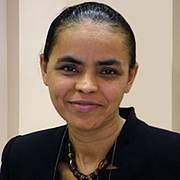Dr Marina Silva, Brazil
06 July 2012 | News story
Former Brazilian Environment Minister (2003-2008) and Former Brazilian Senator (1994-2010) Marina Silva is recognized for her exemplary leadership of the conservation cause in the Amazon region, Brazil, and for forests and local communities globally.
Marina Silva was born into a rubber tapping community in the Amazon jungle. Although early social difficulties and health problems kept her from school until a late stage of her youth, she never stopped learning from then on, continuing to post-graduate level. Her environmental engagement began with the Forest Peoples Movement where her action not only helped to bring to light the land struggle in the Amazon, and consequent risks for local communities and forests, but also started to raise awareness of Brazilian society about the problems of deforestation. Marina Silva participated in the practice that led to the concept of Extractive Reserves in the Amazon, which were later instrumental to the definition of IUCN Category VI of protected areas.
Among her other successes, Marina developed the Action Plan for the Control and Prevention of Deforestation in the Amazon which resulted in a decrease of 80% in deforestation rates between 2004 and 2008. This has led to reductions of 2 billion CO2 eq. emissions, making the country a standard-bearer in carbon-reduction efforts and climate negotiations.
During her time as Minister of Environment, Brazil advanced strongly in protection, eventually contributing to more than two-thirds of the new terrestrial protected areas designated globally in the decade. She provided strong leadership for the Amazon Region Protected Areas (ARPA) Programme, a major in situ biodiversity conservation initiative to protect 60 million hectares of high quality managed protected areas, ecologically representative of the Brazilian Amazon biodiversity and ecosystem services as well as benefitting local communities.
Throughout her life, she has been at the forefront of the defence of the environment, tropical forests, local communities and sustainable development.



